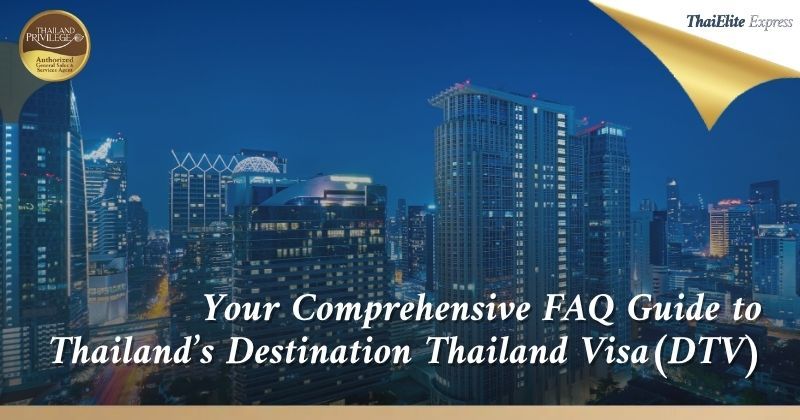
Thailand has firmly cemented its position as a global magnet for travelers, investors, and increasingly, digital nomads and remote workers. The allure of its captivating culture, breathtaking landscapes, and welcoming atmosphere is undeniable. Recognizing this growing trend, the Thai government introduced the Destination Thailand Visa (DTV), a game-changer for those seeking extended stays in the Kingdom. Launched to cater specifically to remote professionals, freelancers, and individuals interested in Thailand’s burgeoning “soft power” activities, the DTV offers a flexible and appealing pathway to long-term residency.
This comprehensive FAQ guide aims to demystify the Destination Thailand Visa, providing clarity on its various aspects, from visa validity and financial prerequisites to application nuances and tax considerations. Whether you’re a seasoned digital nomad eyeing a new base, an aspiring artist immersing yourself in Thai culture, or a family seeking an adventurous “workcation,” understanding the DTV is your first step towards making Thailand your long-term home away from home in 2025 and beyond.
The DTV is designed for flexibility, offering a generous validity period and manageable reporting requirements.
How long is the DTV valid? The DTV is valid for five years from the date of issuance. Crucially, no additional visa fee is required during this five-year period, making it a cost-effective long-term option. However, please note that each in-country stay extension will incur a fee, typically around 1,900 THB.
Do I have to leave Thailand every 90 days? Unlike many standard tourist visas, the DTV does not require you to leave Thailand every 90 days. Each entry grants a stay of up to 180 days. If you stay 90 consecutive days or more, you must file a free 90-day address report at your local immigration office. Leaving and re-entering Thailand will reset the 90-day clock for reporting purposes and also grant you a fresh 180-day stamp.
Can I leave Thailand for a short trip and re-enter after 180 days? Yes, absolutely. The DTV is a multiple-entry visa, meaning you can leave Thailand for a short trip (even for the same or next day) and re-enter. There is no minimum time you must remain outside Thailand. This flexibility is a key advantage for those who wish to explore neighboring countries or return to their home country for short visits. Each re-entry will grant a new 180-day permission to stay.
Financial stability is a cornerstone of the DTV application.
Must I keep a balance of 500,000 THB in my account the whole time? Immigration primarily checks your bank balance when you apply for an in-country 180-day extension. While it’s advisable to maintain a healthy balance, the most critical juncture for demonstrating funds is during application and extension requests.
How long must the funds sit in my account before the first application? Most Royal Thai Embassies and Consulates typically require the funds (500,000 THB or equivalent in foreign currency) to have been in your account for at least three months prior to the initial application date. Some embassies may insist on six months, so it is imperative to always confirm the specific rule at the Thai embassy or consulate where you plan to submit your application. This can vary by location.
Do dependents need their own 500,000 THB? Yes. Each applicant, including spouses and children (under 20 years old), must demonstrate the full amount of 500,000 THB. Joint accounts are acceptable, provided both names appear on the account statement and the total balance meets the combined requirement (e.g., 1 million THB for two people, 1.5 million THB for three, and so on).
Will separate bank countries or addresses cause problems? Normally not, provided your documents are clear and consistent. However, some embassies might request extra proof to demonstrate the relationship between your income and savings, especially if funds originate from various sources or countries. Clarity and transparency in documentation are key.
Navigating the application process requires careful planning.
Passport expiring soon – can I move the visa to a new passport? No. The DTV is affixed to the passport it was initially issued in. If your passport expires, you will need to carry both passports: the old one with the valid DTV and your new passport for travel. Present both at each border crossing.
May I travel while my DTV application is in process? It is strongly advised to remain in the same country where you filed your application until approval. The embassy or consulate might request more documents, further clarification, or an in-person interview, which would be difficult if you are traveling internationally.
Understanding your tax obligations is crucial for long-term stays.
Will I pay Thai tax if I stay over 180 days? Yes. Thailand’s tax laws stipulate that if you reside in the country for 183 days or more in a calendar year (January 1st to December 31st), you are generally considered a Thai tax resident. As a Thai tax resident, you are required to declare your global income, and you may owe Thai Personal Income Tax (PIT) on any foreign-sourced income that is brought into Thailand. However, it’s important to note that as of January 1, 2024, Thailand taxes foreign-sourced income only if it is brought into the country in the same tax year it was earned. Tax treaty relief under Double Taxation Agreements between Thailand and your home country may also apply to prevent double taxation. Consulting with a Thai tax professional is highly recommended for personalized advice.
The DTV offers flexibility for longer periods within Thailand.
What do I need for a 180-day in-country extension? To extend your stay for an additional 180 days while in Thailand, you will generally need to submit a new set of application documents to the Immigration Bureau. This typically includes an updated bank statement showing the minimum 500,000 THB balance. Alternatively, you can perform a “visa-run” abroad (e.g., a quick trip to a neighboring country) and receive a fresh 180-day stamp upon re-entry to Thailand, without needing to resubmit financial proof at immigration.
Do I need to resubmit proof of funds for each extension? Yes, if you choose to extend your stay inside Thailand at an immigration office. For a border run (leaving and re-entering), no additional documentation beyond your valid DTV and passport is typically required, as your visa remains valid.
The DTV encompasses two primary pathways for applicants.
| Topic | Workcation | Soft Power |
| Core purpose | Remote work / freelancing for overseas clients, digital nomads | Participation in cultural, sports, or creative programs (e.g., Muay Thai, Thai cooking, medical tourism) |
| Proof of employment | Required: employment letter from an overseas company, remote work contracts, invoices, tax returns, professional portfolio | Not required (proof of enrollment/participation in activities is needed) |
| Remote income allowed? | Yes, provided all income is sourced outside Thailand. | Yes, provided all income is sourced outside Thailand. |
| Changing institution (e.g., Muay Thai gym) | While possible at the extension stage inside Thailand, changes are generally not permitted during the original visa validity period. Seek clarification from immigration. | Possible at the extension stage inside Thailand, if the new institution provides similar qualifying activities. |
It is crucial to remember that the DTV does が permit employment with Thai companies or earning Thai-sourced income, nor does it typically allow for obtaining a Thai work permit. It is designed for those whose income originates from outside Thailand.
The DTV provides some grace period even if your employment situation changes.
What if I lose my remote job while on a Workcation Visa? You are generally allowed to complete your current 180-day permitted stay even if you lose your job. However, to apply for any subsequent extensions, you must show new proof of remote income or demonstrate sufficient funds to support yourself for the next period. This underlines the importance of financial stability for DTV holders.
Bringing family along on your Thai adventure is possible with the DTV.
Financial requirement for children or spouse? Each dependent (legal spouse and children under 20 years old) must individually meet the 500,000 THB financial requirement.
Can I use the same bank statement for both of us? Yes, if it is a joint account that clearly shows both names and a combined balance that covers all applicants (e.g., 1,000,000 THB for the main applicant and one dependent). Proof of relationship (marriage certificate, birth certificate) will also be required.
While general guidelines exist, individual embassies can have unique requirements.
Are DTV requirements the same across all Thai embassies/consulates? No. Documentation standards and specific interpretations can vary significantly by embassy or consulate. Common differences include the required length of bank statement history (e.g., 3 vs. 6 months), the exact format of financial evidence, or the possibility of additional interviews. Always verify the precise requirements with the specific Royal Thai Embassy or Consulate where you intend to apply to ensure a smooth process and avoid delays.
If an interview is required, particularly for Workcation applicants, be prepared to articulate your professional situation.
What kind of questions can I expect during a DTV interview as a freelancer? Interview questions typically focus on verifying your remote work status and financial capacity. Be ready to discuss:
The Destination Thailand Visa (DTV), a Long-Term Thai Experience
The Destination Thailand Visa (DTV) truly represents a forward-thinking initiative by the Thai government, catering to the evolving landscape of global mobility and remote work. By offering a straightforward, 5-year multiple-entry visa with extended stay periods, it provides an unprecedented level of convenience and stability for digital nomads, remote workers, “soft-power” enthusiasts, and their families.
While the DTV offers immense flexibility and opportunity, understanding its specific requirements and staying compliant with Thai immigration and tax regulations is paramount. From maintaining the requisite proof of funds and filing timely 90-day reports to being aware of your tax residency status, proactive planning will ensure a seamless and rewarding long-term experience in Thailand.
If you require assistance or support in processing the Thailand DTV Visa, please contact our team to schedule a consultation. Embrace the chance to live, work, and explore the enchanting Land of Smiles with the confidence that your visa status is secure.
Disclaimer: The content on this website is provided for general informational purposes and should not be interpreted as legal, financial, or professional advice. While we make every effort to ensure the information is accurate and current, some details may be subject to change or may not be fully up to date. We do not accept liability for any actions taken based on the information presented.

This guide explains the step-by-step process, typical timeline, fees, and the most common reasons LTR applications get delayed or rejected.
詳しくはこちらThailand provides multiple pathways for foreigners to live in Thailand long-term. Your best option depends on your age, financial situation,...
詳しくはこちらWhen considering a Thailand Privilege Visa, choosing the right membership level can significantly impact your experience and the benefits you...
詳しくはこちら
